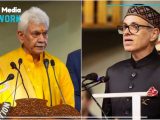
Cultural Disrespect in IIOJK Sparks Outrage
December 30, 2024Tourists’ disregard for Kashmiri culture ignites anger in a region already battling harsh conditions and political turmoil.
Tourist misconduct in Indian Illegally Occupied Jammu and Kashmir (IIOJK) has ignited public outrage as videos surface of visitors drinking alcohol and dancing openly in public spaces. The Muslim-majority population sees these actions as blatant disrespect for their cultural and religious values.
International scholar Ashok Swain shared footage of the incident, condemning the tourists’ behavior. Swain remarked that Hindutva-aligned tourists disregarded Islamic traditions despite visiting a sensitive region like IIOJK, where respect for local norms is essential.
Swain highlighted the glaring hypocrisy, pointing out that the same individuals often advocate violence against Muslims in mainland India over baseless accusations like consuming beef. Yet, in IIOJK, their actions openly violate the cultural fabric of the region.
Kashmiris, known for their hospitality even in severe winters, expressed dismay. Locals recalled how mosques were opened to shelter tourists during snowstorms, only to witness their generosity mocked by such behavior.
Community leaders condemned the incident, urging tourists to honor the religious sentiments of their hosts. Activists called for stronger regulations to prevent similar acts, stressing the importance of preserving Kashmir’s dignity.
Residents voiced frustration, accusing the tourists of exploiting Kashmir’s hospitality while disregarding the region’s sacred traditions. The blatant insensitivity deepened the divide between locals and outsiders, further inflaming tensions in the politically volatile territory.
Kashmir’s cultural and religious identity remains at risk as such incidents highlight the broader issue of outsiders undermining local customs. Community leaders emphasized the need for tourists to recognize and respect the values that define the region.
The incident serves as a reminder of the fragile balance between tourism and cultural preservation in conflict-ridden Jammu and Kashmir. While the region depends on tourism economically, the cost to its identity and traditions cannot be ignored.
Activists have urged local authorities to implement measures ensuring tourists are aware of and adhere to Kashmiri customs. Failure to act could exacerbate resentment and widen the cultural divide.

